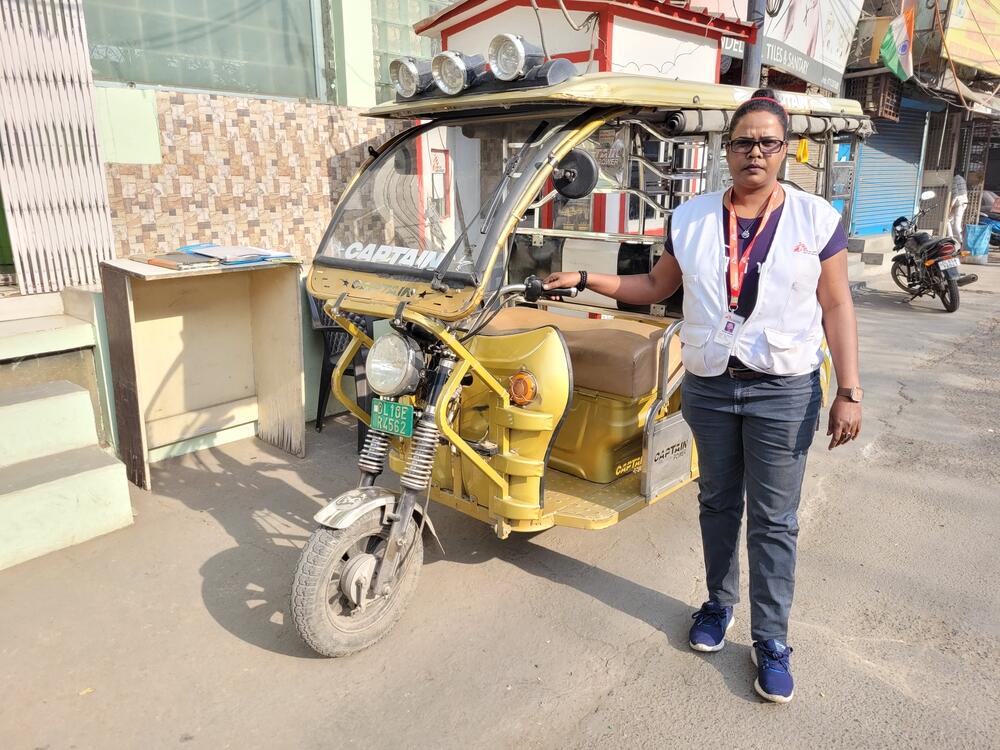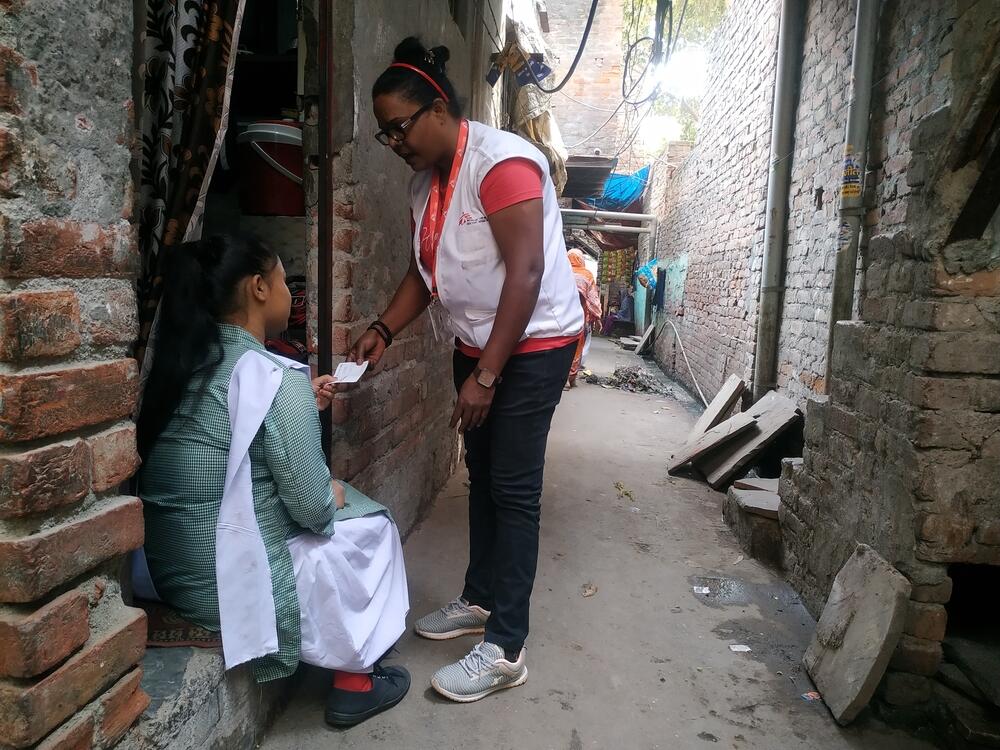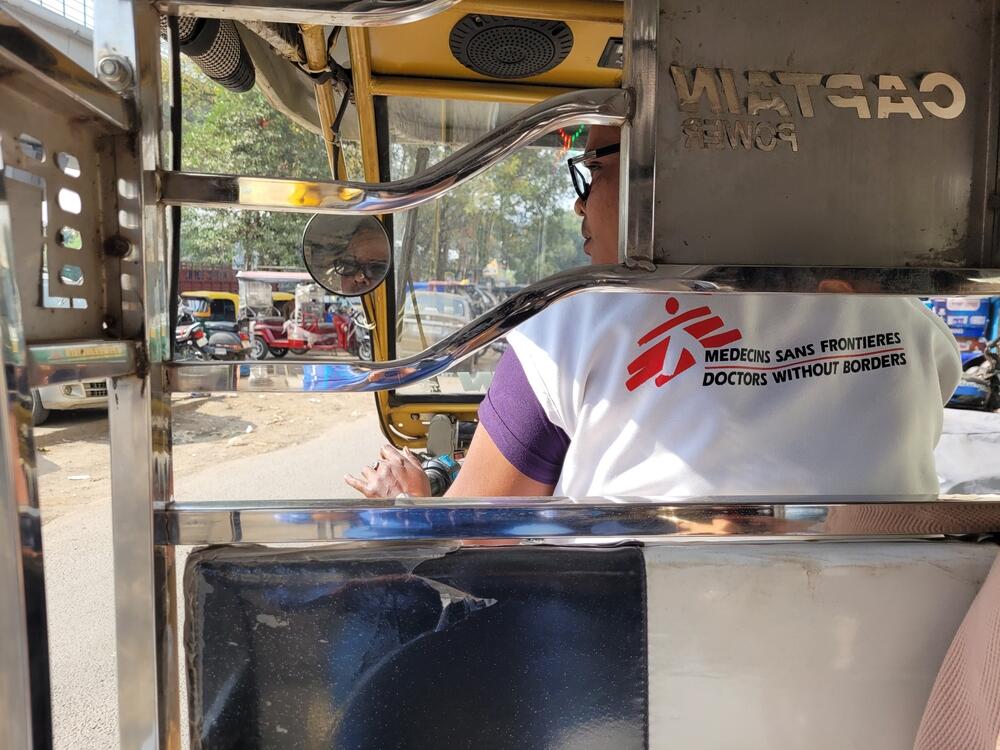India: The sexual violence survivor driving change in Delhi
In Delhi, Fatima rides across the busy Jahangirpuri area of the Indian megacity. In her small e-rickshaw, she transports patients to and from a specialist clinic for survivors of sexual and gender-based violence (SGBV).
On their way to reach care, she talks to often traumatised people and carefully works to gain their trust. She tells them her own story – one they often share.
When her husband died in 2015, Fatima was left with no income, no savings, and no one to turn to.
After taking up a few odd jobs, Fatima eventually decided that she would start driving an e-rickshaw. She sold everything in her house to buy an old vehicle and began driving it around the community. After getting the hang of it, she acquired a mini-celebrity status as the first woman e-rickshaw in the Jahangirpuri area.
"Small kids, college-going children and adults alike would often ask me to stop and pose for photographs,” says Fatima.
“[They would] praise me for doing something that they primarily considered a man's job.”
“She hugged me tightly with tears of happiness in her eyes. She thanked me immensely for getting her the help she needed.”
"In 2016, I was driving my rickshaw in the Aazadpur area when I spotted a woman wearing a white jacket. Assuming the person must be an official, I got scared and felt that they might take away my rickshaw as my license was still pending.
"However, she asked me to drop her near the Jahangirpuri metro station at Umeed Ki Kiran, a clinic run by Médecins Sans Frontières / Doctors Without Borders (MSF).
"The woman held my hand gently while getting down but I was panic-stricken. I thought they would snatch my rickshaw, which was my only source of livelihood. I started tearing up.
"The woman spoke in English, and I can still vividly recall how the person with her calmed me down and explained that they wanted me to work as an e-rickshaw driver for the clinic.
"It’s now been over seven years since I started working with MSF."
A shared story of SGBV
Umeed Ki Kiran is a specialist clinic for survivors of SGBV, established by MSF in 2015.
Fatima reaches the clinic at 8:30 am, before spending the day driving across the community to collect and drop off survivors for their medical treatment and counselling. Her work also includes taking community healthcare workers to where they need to be.
SGBV is a common consequence of unequal power relationships and can include acts such as rape and intimate partner violence. Although the majority of survivors of SGBV are women and girls, men and boys can also be harmed.
According to the Ministry of Health, around 30 percent of women in India face physical or sexual violence, however, only two percent will seek care.
The stigma and shame often associated with SGBV are the reason why so few people come forwards. This is where community support can play a crucial role.
Never miss an update
Get the latest personal accounts from MSF staff with our email newsletter, Frontline.
You'll also receive our best stories, critical updates and unique ways to get involved.
As someone who has survived SGBV herself, Fatima deeply empathises with the patients she meets and is dedicated to supporting them. She understands the difficult journey they are on and the complex emotions they may be experiencing.
Fatima remembers one such occasion:
“There was one time when I was taking a community health worker to visit a hospital.
“While I was waiting for them, I saw a young girl, probably in her 20s, sitting and crying inconsolably. I approached her gently and she finally opened up to me about her experience with SGBV.
“It was obvious that it had taken a lot of courage for her to share this with me, so I made sure to listen attentively and be as supportive as possible.
“I slowly convinced her to visit the clinic and talk to MSF counsellors. She was hesitant initially, but when I told her about my own journey and showed her my MSF identity card, she agreed.
“When that girl came out of the clinic after her counselling, she hugged me tightly with tears of happiness in her eyes. She thanked me immensely for getting her the help she needed.
“I still get goosebumps when I think about her.”
A community of survivors
Fatima might be one of the first MSF team members a survivor meets during their treatment. So, she knows the importance of talking to patients with compassion so as not to trigger secondary trauma.
Being from the community herself, she works to build trust and rapport with patients. Something that is vital to safely linking them with the next stage of their care.
“I feel extremely fortunate that I am on the other side of the situation where I can lead others to any sort of help”
In essence, by speaking to survivors, Fatima helps them trust both her and, in turn, MSF.
“I belong to the same community of patients and survivors. It gives me immense satisfaction to be able to aid them in any manner,” says Fatima.
“I have lived the same trauma and faced intense violence in my life. Despite this, I feel extremely fortunate that I am on the other side of the situation where I can lead others to any sort of help.
"As soon as they sit in my e-rickshaw, I tell them: ‘Don't cry, have faith and stay strong and focus on moving forward and healing yourself’.”
Fatima's story is a testament to the importance of community support for survivors of SGBV.
She is not just a driver, but rather an indispensable link between the wider community, patients and healthcare services. She ensures that human and non-intrusive support beings from the moment a survivor steps into her rickshaw.
"A lot of times, women and young ladies have even expressed their interest in learning to drive an e-rickshaw like me and being financially independent," says Fatima.
"I see the glimmer of hope in their eyes when they see a woman coming to collect them.”
MSF and sexual and gender-based violence
Sexual and gender-based violence (SGBV) is a medical emergency that shatters the lives of millions across the globe. It can occur in any society at any time but often increases in unstable situations, such as armed conflicts.
We strive to make comprehensive healthcare available to survivors, regardless of their age or gender, in all of our projects.


